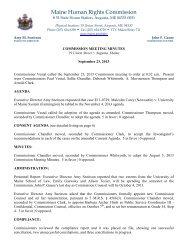SOS: A Handbook for Survivors of Suicide - American Association of ...
SOS: A Handbook for Survivors of Suicide - American Association of ...
SOS: A Handbook for Survivors of Suicide - American Association of ...
You also want an ePaper? Increase the reach of your titles
YUMPU automatically turns print PDFs into web optimized ePapers that Google loves.
Acceptance<br />
Acceptance is the key to healing <strong>for</strong> the survivor <strong>of</strong><br />
suicide, but it is a deceptively simple concept. First<br />
<strong>of</strong> all, most <strong>of</strong> us operate under the assumption that<br />
we are already “accepting” the suicide. After all, only<br />
a deluded few would fail<br />
to believe that the event<br />
actually happened. That’s<br />
“acceptance,” isn’t it?<br />
It may be the beginnings<br />
<strong>of</strong> acceptance, but<br />
it’s not the entire understanding.<br />
Accepting a suicide<br />
means not only<br />
acknowledging the basic<br />
reality, but accepting the<br />
contributing factors and<br />
the ramifications <strong>of</strong> it—<br />
without embellishing<br />
them with invented ideas,<br />
either positive or negative.<br />
For example, you<br />
might have to accept that<br />
your loved one lost a very<br />
long battle with depression.<br />
If you were to<br />
embellish this reality<br />
❦<br />
Reconciling with<br />
a suicide victim<br />
Losing someone to a “conventional”<br />
death, while difficult, does not interfere with<br />
our happy memories <strong>of</strong> them. But suicide<br />
survivors <strong>of</strong>ten feel disconnected and<br />
“divorced” from the memory <strong>of</strong> their lost<br />
loved one. Because they chose to end their<br />
lives—to our rational minds, an<br />
inconceivable act—we are now in a state <strong>of</strong><br />
conflict with them. At some point, we need<br />
to “reconcile” with them—and somehow,<br />
we have to accomplish this alone.<br />
Un<strong>for</strong>tunately, this usually takes some<br />
time. For most survivors, it’s a reward that<br />
lies somewhat down the road, after we have<br />
passed through all the fury <strong>of</strong> our emotional<br />
gauntlet and achieved acceptance—acceptance<br />
<strong>of</strong> our human limitations, <strong>of</strong> our loved<br />
one’s debilitated condition, and <strong>of</strong> our lives<br />
as they now lay be<strong>for</strong>e us.<br />
either positively (by denying the fact that such a severe emotional<br />
illness could have existed within them) or negatively<br />
(by unfairly holding yourself responsible <strong>for</strong> not having<br />
“cured” them <strong>of</strong> it), then you are not truly accepting the suicide<br />
<strong>for</strong> what it is—a tragic event that, while wholly unwelcome,<br />
was beyond the control <strong>of</strong> you and those around you<br />
24

















